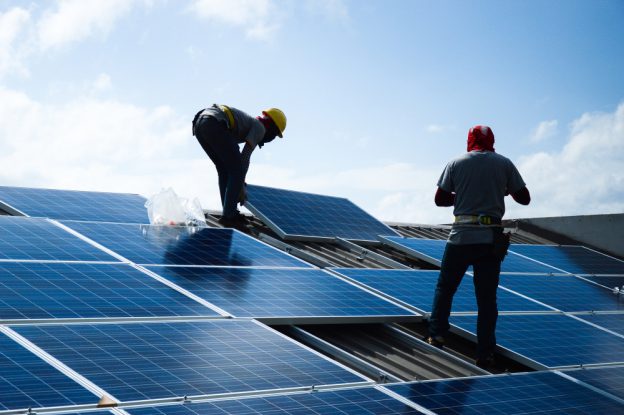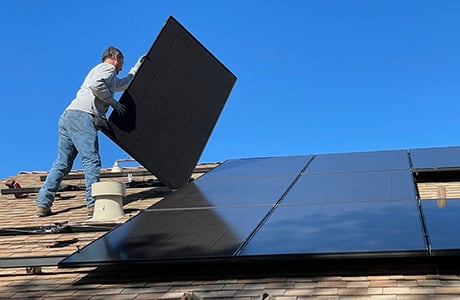How to Pick the Right Solar Power Setup for Your Energy Demands
Selecting a suitable solar power installment needs a systematic approach that starts with a clear understanding of your power consumption patterns and awaited future needs. Factors such as the type of solar innovation, setup costs, and offered motivations play crucial roles in making an informed decision.
Assess Your Energy Demands
Analyzing your power requires is an important primary step in the solar energy installment process. Comprehending your existing and future power intake will guide the design of an effective solar system tailored to your needs. Beginning by analyzing your utility costs from the previous year to determine your average month-to-month power use, usually determined in kilowatt-hours (kWh) This data will supply a foundation for computing the dimension of the planetary system you might require.
Consider seasonal variants in power intake, as certain months may require even more power due to home heating or air conditioning requirements. Additionally, assess any planned changes in way of living or residential or commercial property, such as the acquisition of electric cars or home developments, which might enhance your power needs in the future.
As soon as you have a thorough understanding of your power usage, you can identify the proper solar capacity required to meet those requirements. This analysis not only aids in sizing the solar installment but also informs choices concerning power storage space solutions and potential grid connection needs. solar photovoltaic. Eventually, precisely evaluating your energy needs makes certain that your solar energy system operates efficiently, supplying the benefits of eco-friendly energy in positioning with your intake patterns

Evaluate Solar Technology Options
When taking into consideration a solar energy installation, it is important to examine the numerous solar modern technology options offered to make sure the system lines up with your power requirements and spending plan. The main technologies consist of monocrystalline, polycrystalline, and thin-film photovoltaic panels, each offering unique benefits and disadvantages.
Monocrystalline panels are understood for their high efficiency and efficiency in restricted room, making them suitable for domestic setups with less roofing area. They tend to be much more expensive. Polycrystalline panels, while a little less efficient, are normally a lot more budget friendly and can be a great option for larger setups where room is not a constraint. Thin-film photovoltaic panels are lightweight and adaptable, ideal for unique surfaces, but they commonly have lower effectiveness and require more space to create the very same energy outcome.
In addition to panel types, take into consideration solar inverters, which convert the direct current created by the panels into alternating existing for home usage. String inverters, microinverters, and power optimizers each have one-of-a-kind benefits that can impact system efficiency. Examining these choices will certainly help you make an educated choice that meets your energy requirements properly.
Consider Setup Prices
Understanding setup costs is important for anybody taking into consideration a solar energy system. These costs can vary dramatically based on several aspects, including system dimension, sort of panels, and installment intricacy. A common property solar installment might range from $15,000 to $30,000 prior to rewards, which can be a significant in advance investment.
To accurately assess setup expenses, it is necessary to acquire detailed quotes from multiple solar carriers. These quotes need to damage down the prices of equipment, labor, permits, and any type of extra accessories required for the setup. Pay close interest to the top quality of materials being used, as higher-quality panels and inverters can lead to far better effectiveness and long life, potentially offsetting greater initial expenses.
Moreover, consider the lasting effects of setup expenses. A more affordable setup could conserve money upfront however might bring about greater upkeep expenses or minimized power production with time. It is also recommended to evaluate funding alternatives, such as solar financings or leases, which can impact your general economic dedication.
Study Citizen Motivations
Checking out neighborhood motivations can substantially affect the total expense of a solar power installment. Many regions supply a range of economic incentives targeted at promoting renewable power use, making solar energy extra available and budget friendly for home owners and organizations alike.
These rewards may include government tax obligation credits, state discounts, and regional energy company programs that offer cash money incentives or web metering options. For circumstances, the Federal Investment Tax Credit Scores (ITC) allows you to subtract a considerable percent of your solar installment prices from your federal tax obligations. State-specific motivations can even more improve these financial savings, often in the type of straight cash discounts or tax click credit scores.
Furthermore, some neighborhood federal governments may supply real estate tax exemptions for solar installments, ensuring that your investment does not raise your real estate tax obligation. Looking into these motivations can uncover substantial savings, which can influence your choice on the size and kind of solar system to set up.

Choose a Reputable Installer
Choosing a reputable installer is essential to making sure the success and longevity of your solar power system. The setup procedure significantly impacts the performance and efficiency of your solar panels, making it critical to choose a contractor with a proven track record.
Next, validate the installer's credentials, including licenses, accreditations, and insurance policy. A reliable installer must hold qualifications from acknowledged companies, such as the North American Board of Licensed Energy Experts (NABCEP), showing a high degree of knowledge. Furthermore, ask about the installer's experience with comparable tasks, especially in your location, as neighborhood environment and laws can influence setup look what i found techniques.
Demand multiple quotes and contrast them not only on cost yet likewise on the quality of tools and warranties used. A reliable installer should offer transparent info regarding their items and solutions, aiding you make an educated choice. By investing time in click this site choosing a respectable installer, you will certainly improve the total efficiency and resilience of your solar power system.
Conclusion
To conclude, choosing the appropriate solar energy setup necessitates a complete analysis of energy requirements, an understanding of readily available solar innovations, and a cautious consideration of installment costs. Exploring local incentives can improve financial benefits, while selecting a respectable installer makes certain high quality craftsmanship and dependability. solar photovoltaic. By methodically examining these elements, people can accomplish an optimum solar service that fulfills both existing and future power needs, eventually contributing to sustainable energy techniques and price financial savings gradually